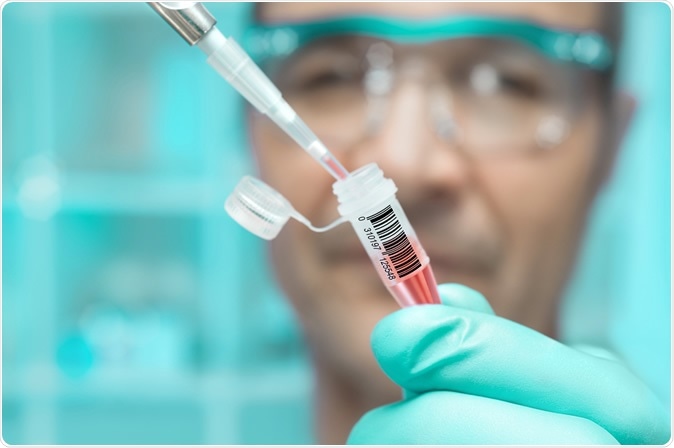The coronavirus disease (COVID-19) has no approved treatment or vaccine as the world grapple with its wrath. The viral infection has so far infected 1.8 million and killed more than 114,000 people. Now, a team of scientists has shown that an experimental antiviral drug, remdesivir, has shown promise in treating patients with severe COVID-19.
In a small group of patients hospitalized with severe complications of COVID-19, a team of health experts has found that that remdesivir, a nucleotide analog that inhibits viral RNA polymerases, has shown in vitro activity against the severe acute respiratory syndrome coronavirus 2 (SARS-CoV-2), the causative agent of COVID-19.

Study: Compassionate Use of Remdesivir for Patients with Severe COVID-19 / Shutterstock Image Credit: Anyaivanova / Shutterstock
Gilead Sciences developed Remdesivir as a treatment for Ebola virus disease and Marburg virus infections. Remdesivir is a prodrug in that it is inactive in intended pharmacological actions and must be converted into the pharmacologically active agent by metabolic or physico-chemical transformation.
The experimental therapy
The experimental therapy was administered to the patients through compassionate use, which allows the providers access to treatments that are not yet approved by the Food and Drug Administration (FDA) when a patient faces a life-threatening situation, and there are no current available options.
Remdesivir was administered to patients with confirmed SARS-CoV-2 infection and had an oxygen saturation of less than 94 percent while they are breathing ambient air or who were under oxygen support. The patients received a 10-day course of remdesivir, consisting of 200 milligrams administered through the intravenous route on the first day and then 100 milligrams daily for the remaining nine days of treatment.
Promising results
The team of health experts from Cedars-Sinai Hospital found that 61 patients received at least one dose of the drug, but only 53 were analyzed. Twenty-two of the patients were from the United States. Of these, 36 patients or 68 percent had shown improvement with the use of the drug, including 17 of the 30 patients who are hooked to mechanical ventilation who were extubated. About 47 percent of the patients were discharged, while 13 percent or seven patients had died.
The team also revealed that from the most severe cases, those who had invasive ventilation has a fatality rate of 18 percent. At the same time, there was one death of a patient who was not receiving invasive ventilation. Among the common side effects noted included rash, diarrhea, and in some cases, renal impairment.
Other side effects include hypotension and increased hepatic enzymes.
“In this cohort of patients hospitalized for severe COVID-19 who were treated with compassionate-use remdesivir, clinical improvement was observed in 36 of 53 patients (68%). Measurement of efficacy will require ongoing randomized, placebo-controlled trials of remdesivir therapy,” the researchers wrote in the paper, which was published in The New England Journal of Medicine.
Further research needed
To date, no therapy has demonstrated efficacy for patients with COVID-19, and most therapies being used focus on boosting the patient’s immune system.
The preliminary reports describe the clinical outcomes in a small cohort of patients who were severely ill due to COVID-19. The researchers pointed out that the study still needs validation through randomized and controlled trials to provide more informative evidence regarding the efficacy and safety of remdesivir for coronavirus disease. In comparison, a recent trial of the lopinavir-ritonavir in patients with COVID-19, the 28-day mortality was 22 percent.
“It’s critical that the medical community finds a safe and effective treatment for COVID-19 that’s supported by solid data. I’m very proud that Cedars-Sinai is contributing to the global effort to find that solution,” Dr. Jonathan D. Grein, director of Hospital Epidemiology, said.
The researchers also emphasize that the interpretation of the study results is limited by the small size of the participants and the short duration of follow-up. Still, the study sheds light on the potential of the drug as a therapy to combat COVID-19, which as now spread to 185 countries.
“Currently there is no proven treatment for COVID-19. We cannot draw definitive conclusions from these data, but the observations from this group of hospitalized patients who received remdesivir are hopeful. We look forward to the results of controlled clinical trials to potentially validate these findings,” Grein, who also leads the Special Pathogens Response Team at Cedars-Sinai, added.
The coronavirus disease global pandemic has placed many countries into lockdown, while the United States has reported the most number of cases. The country has a case toll of more than 557,000, while the death toll has topped 22,000.
Sources:
Journal reference: